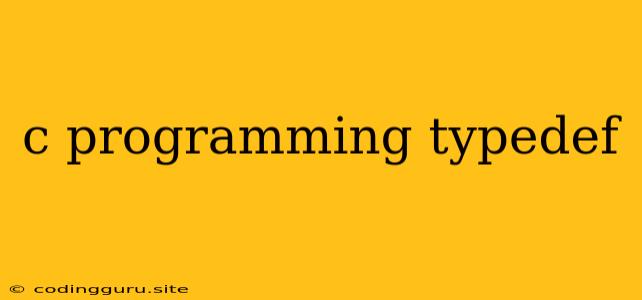What is a typedef in C programming and why should we use it?
In the realm of C programming, we often encounter various data types like int, float, char, and double. These data types represent fundamental building blocks for storing different kinds of data. However, sometimes we need to create custom data types to represent specific data structures or concepts within our program. This is where typedef comes into play.
Understanding typedef in C
typedef is a keyword in C that allows us to create aliases (alternative names) for existing data types. It doesn't create a new data type itself, but rather provides a shorthand or more meaningful name for an existing one.
Think of typedef as a "shortcut" or a "nickname" for a data type.
Let's break it down with an example:
typedef int INTEGER;
In this code, we use typedef to create an alias named INTEGER for the existing int data type. Now, we can use INTEGER anywhere in our code where we would normally use int.
Benefits of Using typedef
Using typedef in your C code offers several advantages:
-
Improved Code Readability: When you work with complex data structures, using descriptive
typedefnames can significantly enhance the readability of your code. For instance, instead of writingstruct node *list;, you could create atypedefforstruct node *and name itLIST_NODE. This makes your code easier to understand and maintain. -
Code Portability: When your code needs to be ported across different systems, using
typedefcan help to avoid conflicts due to potential variations in data type sizes. -
Abstraction: By using
typedef, you can abstract away the underlying data types, allowing for more flexible code design. This makes it easier to change data types later without affecting the overall logic of your code. -
Enhanced Type Safety:
typedefcan promote better type safety in your code. By defining clear aliases for data types, you reduce the risk of accidental type mismatches during variable declaration or function arguments.
Examples of typedef Usage
Let's explore some practical scenarios where using typedef can prove beneficial:
1. Defining a Custom Data Type for Complex Numbers:
typedef struct {
float real;
float imag;
} Complex;
Here, we define a structure named Complex to represent complex numbers. By using typedef, we can now declare variables of type Complex directly:
Complex c1, c2;
2. Creating a Type for a Function Pointer:
typedef int (*CompareFunc)(int, int);
This typedef creates a new type CompareFunc that represents a function pointer which takes two integers as arguments and returns an integer. Now, you can declare function pointers of type CompareFunc:
CompareFunc compare_integers;
3. Simplifying Code with Custom Data Types:
Imagine you are working with a large codebase where you frequently use the data type unsigned long long int. By creating a typedef, you can simplify your code significantly:
typedef unsigned long long int ULLONG;
ULLONG large_number = 1234567890; // Easier to read and maintain
Important Considerations
While typedef is a powerful tool, it's crucial to use it responsibly. Avoid creating aliases for fundamental data types that are already well-established (e.g., int, float). Focus on using typedef to create meaningful aliases for custom data structures or complex types that improve the clarity and maintainability of your code.
Conclusion
typedef is a valuable feature in C programming that allows you to create aliases for existing data types. By leveraging its capabilities, you can enhance the readability, portability, and abstraction of your code, ultimately improving its maintainability and type safety. Remember to use typedef strategically to create meaningful names that reflect the purpose of your custom data types.
